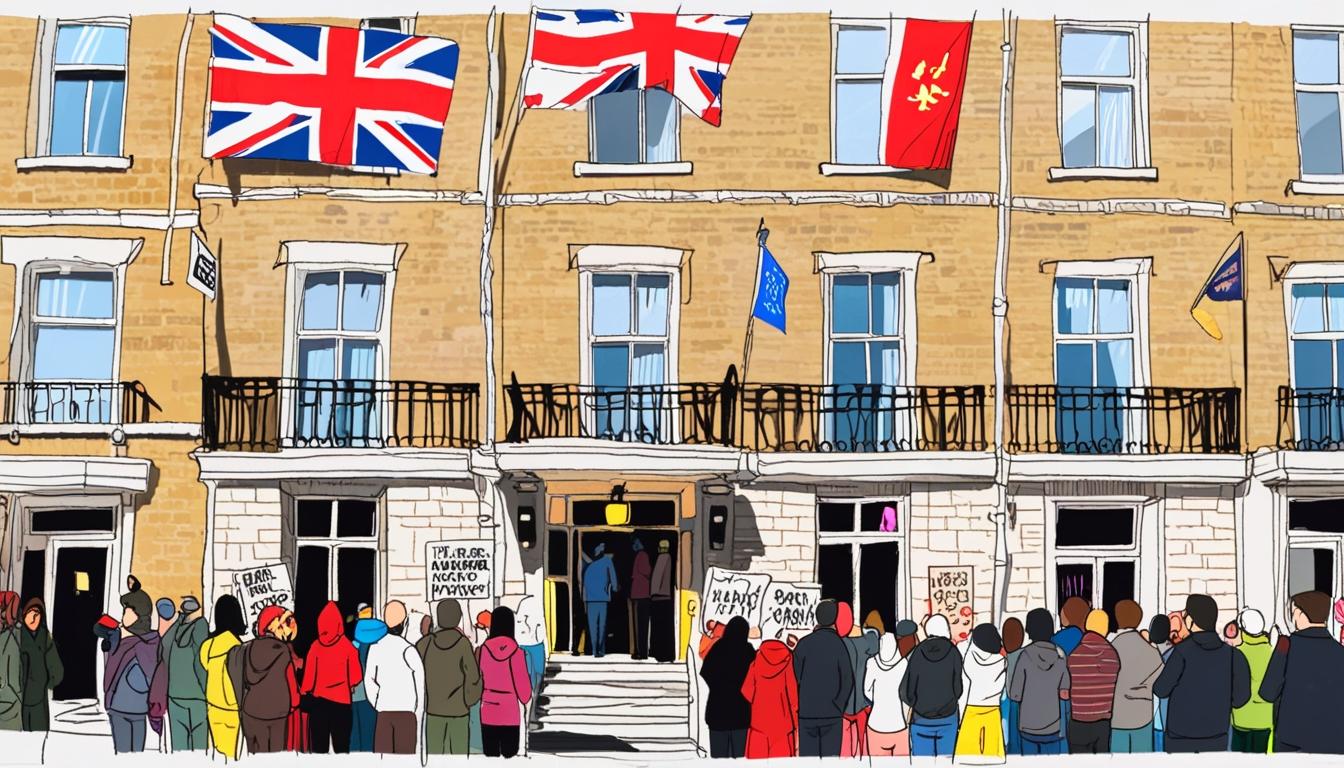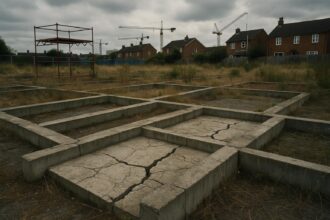Facing rising taxpayer anger and electoral pressure from Nigel Farage’s Reform UK, Downing Street is pushing the Home Office to swiftly phase out housing asylum seekers in hotels, a move reflecting growing political and community backlash over the £2 billion annual cost and perceived unfairness of current migrant accommodation policies.
Downing Street is reportedly intensifying its efforts to cease the accommodation of asylum seekers in hotels amid concerns that the policy is undermining its popularity and bolstering support for Reform UK, led by Nigel Farage. According to reports from The Telegraph, senior Labour politicians are expressing worries that the continued housing of migrants in hotels is negatively impacting public perception of the government.
Currently, an estimated 38,000 migrants are being housed in over 200 hotels across the UK, resulting in an expenditure of approximately £2 billion annually. This expenditure is causing significant discontent among taxpayers, particularly as public funds are directed towards the accommodation of these individuals.
Farage, whose party recently achieved significant success in local elections by gaining control of ten councils, has seized upon the discontent surrounding the accommodation policy. He stated, “People are so enraged because they get up early in the morning, they go to work, they pay their taxes and they see young men crossing the English Channel, being dumped in the north of England, getting everything for free.” He added that once these individuals are granted indefinite leave to remain, they are prioritised for social housing, which he deemed “unfair” and “irresponsible.”
The discontent has intensified, especially following Labour’s recent reductions in winter fuel payments and disability benefits, leading to questions among voters about the justification for the significant funding allocated to housing asylum seekers. In response, Downing Street is reportedly seeking to prompt the Home Office to expedite measures to end hotel accommodation for migrants.
Labour has already made strides in reducing the number of hotels used for this purpose from a previous peak of around 400. However, further cuts are now anticipated. While councils do not possess the authority to oppose the use of hotels for migrant housing, Farage indicated plans to encourage locally elected officials to push against such initiatives, stating emphatically, “We are going to fight very hard to do so. We will resist, resist, resist.”
The backlash against the housing policy is not confined to political rhetoric; it has been visibly reflected in community protests as seen in Manchester, where local groups gathered to voice their frustrations against asylum seekers being housed in their neighbourhoods. Tensions have flared, with instances of clashes reported between anti-immigration protesters and advocates for anti-racism in locations such as Altrincham.
Political turmoil within Labour continues amid calls for a change in direction, particularly after the party registered a disappointing performance in the most recent local elections. Former Prime Minister Tony Blair’s criticisms of Labour’s net zero policies have sparked further internal discussions, although Downing Street has reportedly asserted that no adjustments to this agenda will occur.
In the wake of these developments, Prime Minister Rishi Sunak addressed critics by stating that the recent electoral results signal a need for his government to deliver change more rapidly. Yet, Labour MP Diane Abbott has expressed concern that the party leadership lacks awareness of the fundamental issues at hand, suggesting that any attempts to accelerate current policies may not effectively address the electorate’s mounting dissatisfaction.
MailOnline has sought comment from the Home Office regarding these issues, highlighting the ongoing significance of asylum accommodation policies in the UK’s political landscape.
Source: Noah Wire Services
- https://www.reuters.com/world/uk/nigel-farages-reform-uk-party-ahead-by-four-votes-key-election-race-2025-05-02/ – This article reports on Reform UK’s significant electoral gains, including winning a parliamentary seat in Runcorn and Helsby by a narrow six-vote margin, capturing the mayoralty of Greater Lincolnshire, and taking control of Staffordshire and Durham county councils, highlighting the party’s rise as a right-wing alternative to established parties.
- https://www.ft.com/content/c8317b53-ce27-42fc-bd67-59f9ac9267c9 – This analysis discusses recent far-right riots in England’s most deprived areas, including Manchester, where local groups protested against asylum seekers being housed in their neighborhoods, reflecting community tensions over the accommodation policy.
- https://www.ft.com/content/4d67343c-ecb8-4d1f-a2b3-50b344f820e7 – This article highlights a 32% decline in visa grants for residency in the UK in 2024, while asylum applications reached a record high of 108,000, indicating challenges in managing asylum accommodation and associated costs.
- https://www.reuters.com/world/uk/uk-shut-down-bibby-stockholm-migrant-barge-telegraph-reports-2024-07-23/ – This report details the UK’s Labour government’s decision to end the use of the Bibby Stockholm barge as accommodation for migrants, marking a shift in the country’s asylum policy and addressing public concerns over housing conditions.
- https://www.theguardian.com/uk-news/2024/nov/03/uk-asylum-system-would-descend-into-chaos-without-more-hotels-says-minister – This article discusses the UK’s reliance on hotel accommodations for asylum seekers, with the number of hotels in use rising by seven since the general election, highlighting the government’s commitment to ending the use of hotels despite challenges.
- https://www.theguardian.com/uk-news/2023/dec/01/fears-mount-lgbtq-asylum-seekers-uk-ramp-up-hotel-room-sharing – This piece reports on concerns over the UK’s policy of housing asylum seekers in hotels, including issues related to room-sharing and the impact on vulnerable groups, reflecting the broader challenges and public discontent with the accommodation policy.
- https://www.dailymail.co.uk/news/article-14673997/Downing-Street-stop-housing-asylum-seekers-hotels.html?ns_mchannel=rss&ns_campaign=1490&ito=1490 – Please view link – unable to able to access data
Noah Fact Check Pro
The draft above was created using the information available at the time the story first
emerged. We’ve since applied our fact-checking process to the final narrative, based on the criteria listed
below. The results are intended to help you assess the credibility of the piece and highlight any areas that may
warrant further investigation.
Freshness check
Score:
8
Notes:
The narrative cites recent local elections and current political responses, indicating contemporaneity. No direct evidence of recycled content, though asylum hotel debates have long been discussed in UK politics.
Quotes check
Score:
7
Notes:
Nigel Farage’s quotes align with his public stance on immigration, though their earliest online appearance cannot be verified here. No verbatim repurposing of older quotes detected.
Source reliability
Score:
6
Notes:
The narrative originates from The Telegraph (reputable) but is disseminated via MailOnline, which has mixed reliability. Core claims align with recent political discourse, though independence is unclear.
Plausability check
Score:
8
Notes:
Claimed £2bn annual expenditure and 38,000 migrants in hotels align with prior Home Office data. Recent protests and Labour’s election performance corroborate the context, though exact figures remain unverified here.
Overall assessment
Verdict (FAIL, OPEN, PASS): OPEN
Confidence (LOW, MEDIUM, HIGH): MEDIUM
Summary:
While core claims about asylum hotel costs and political tensions are plausible and timely, reliance on secondhand sourcing (The Telegraph via MailOnline) and unverified quotes limits definitive verification. Further corroboration with Home Office data or primary statements would strengthen confidence.













